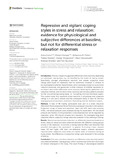Citation link:
10.3389/fpsyg.2023.1196481| DC Field | Value | Language |
|---|---|---|
| crisitem.author.orcid | 0000-0002-0741-9045 | - |
| crisitem.author.orcid | 0000-0001-8639-8547 | - |
| crisitem.author.orcid | 0000-0003-0713-5285 | - |
| crisitem.author.orcid | 0000-0001-7558-1274 | - |
| crisitem.author.orcid | 0000-0002-0321-6187 | - |
| crisitem.author.orcid | 0000-0001-9798-1762 | - |
| crisitem.author.orcid | 0000-0003-2007-6128 | - |
| crisitem.author.orcid | 0000-0003-2433-6652 | - |
| dc.contributor.author | Exner, Anna | - |
| dc.contributor.author | Kampa, Miriam | - |
| dc.contributor.author | Finke, Johannes | - |
| dc.contributor.author | Stalder, Tobias | - |
| dc.contributor.author | Klapperich, Holger | - |
| dc.contributor.author | Hassenzahl, Marc | - |
| dc.contributor.author | Kleinke, Kristian | - |
| dc.contributor.author | Klucken, Tim | - |
| dc.date.accessioned | 2023-12-20T14:53:28Z | - |
| dc.date.available | 2023-12-20T14:53:28Z | - |
| dc.date.issued | 2023 | de |
| dc.description | Finanziert aus dem DFG-geförderten Open-Access-Publikationsfonds der Universität Siegen für Zeitschriftenartikel | de |
| dc.description.abstract | Introduction: Previous research suggested differential stress reactivity depending on individuals’ coping style, e.g., as classified by the model of coping modes. Specifically, stronger physiological reactivity and weaker subjective stress ratings were found for repressors than for sensitizers. However, it remains to be investigated (i) whether these findings, which are largely based on social stress induction protocols, also generalize to other stressors, (ii) whether repressors vs. sensitizers also exhibit differential stress recovery following the application of a relaxation method, and (iii) which stress reactivity and recovery patterns are seen for the two remaining coping styles, i.e., fluctuating, and non-defensive copers. The current study thus examines stress reactivity in physiology and subjective ratings to a non-social stressor and the subsequent ability to relax for the four coping groups of repressors, sensitizers, fluctuating, and non-defensive copers. Methods: A total of 96 healthy participants took part in a stress induction (Mannheim Multicomponent Stress Test) and a subsequent relaxation intervention. Subjective ratings of stress and relaxation, heart rate (HR), heart rate variability (HRV), and blood pressure were assessed during the experiment. HR and blood pressure are markers of the sympathetic stress response that can be regulated by relaxation, while HRV should increase with relaxation. To investigate long-term relaxation effects, subjective ratings were also assessed on the evening of testing. Results: Despite successful stress induction, no differential responses (baseline to stress, stress to relaxation) were observed between the different coping groups on any of the measures. In contrast, a strong baseline effect was observed that persisted throughout the experiment: In general, fluctuating copers showed lower HR and higher HRV than non-defensive copers, whereas repressors reported lower subjective stress levels and higher levels of relaxation during all study phases. No differences in subjective ratings were observed in the evening of testing. Conclusion: Contrary to previous research, no differential stress reactivity pattern was observed between coping groups, which could be due to the non-social type of stressor employed in this study. The novel finding of physiological baseline differences between fluctuating and non-defensive individuals is of interest and should be further investigated in other stressor types in future research. | en |
| dc.identifier.doi | 10.3389/fpsyg.2023.1196481 | de |
| dc.identifier.uri | https://dspace.ub.uni-siegen.de/handle/ubsi/2599 | - |
| dc.identifier.urn | urn:nbn:de:hbz:467-25994 | - |
| dc.language.iso | en | de |
| dc.source | Frontiers in psychology ; 14, 1196481. - https://doi.org/10.3389/fpsyg.2023.1196481 | de |
| dc.subject.ddc | 150 Psychologie | de |
| dc.subject.other | Repressors | en |
| dc.subject.other | Sensitizers | en |
| dc.subject.other | Heart rate variability | en |
| dc.subject.other | Blood pressure | en |
| dc.subject.other | MMST | en |
| dc.subject.other | Stress | en |
| dc.subject.other | Relaxation | en |
| dc.subject.other | Repressoren | de |
| dc.subject.other | Sensibilisatoren | de |
| dc.subject.other | Variabilität der Herzfrequenz | de |
| dc.subject.other | Blutdruck | de |
| dc.subject.other | Entspannung | de |
| dc.title | Repressive and vigilant coping styles in stress and relaxation: evidence for physiological and subjective differences at baseline, but not for differential stress or relaxation responses | en |
| dc.title.alternative | Repressive und vigilante Bewältigungsstile bei Stress und Entspannung: Nachweis von physiologischen und subjektiven Unterschieden bei Baseline, aber nicht für unterschiedliche Stress- oder Entspannungsreaktionen | de |
| dc.type | Article | de |
| item.fulltext | With Fulltext | - |
| ubsi.publication.affiliation | Fakultät V - Lebenswissenschaftliche Fakultät | de |
| ubsi.source.doi | 10.3389/fpsyg.2023.1196481 | - |
| ubsi.source.issn | 1664-1078 | - |
| ubsi.source.issued | 2023 | de |
| ubsi.source.issuenumber | 14 | de |
| ubsi.source.pages | 11 | de |
| ubsi.source.place | Lausanne | de |
| ubsi.source.publisher | Frontiers Research Foundation | de |
| ubsi.source.title | Frontiers in Psychology | de |
| Appears in Collections: | Geförderte Open-Access-Publikationen | |
Files in This Item:
| File | Description | Size | Format | |
|---|---|---|---|---|
| Repressive_and_vigilant_coping_styles.pdf | 770.48 kB | Adobe PDF |  View/Open |
This item is protected by original copyright |
Page view(s)
302
checked on Dec 25, 2024
Download(s)
51
checked on Dec 25, 2024
Google ScholarTM
Check
Altmetric
Items in DSpace are protected by copyright, with all rights reserved, unless otherwise indicated.

